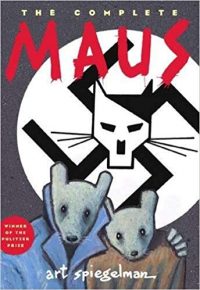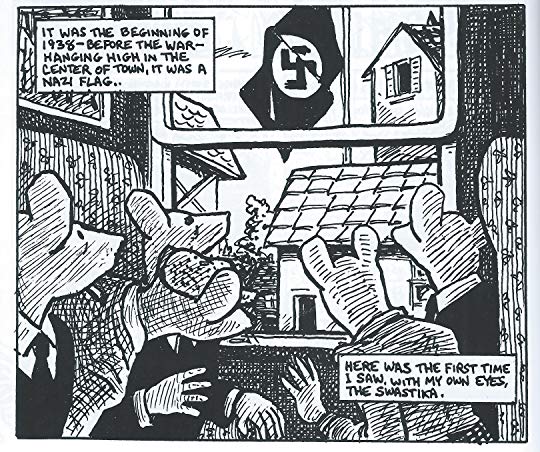My father bleeds history

The Complete Maus
by Art Spiegelman
I’m not sure what this says about my state of mind, but for some reason the celebrations surrounding the anniversary of the fall of the Berlin Wall last weekend made me pick up this book that famously covers some of the worst stories of the Holocaust. It’s a deeply upsetting book that I had to take breaks from to recover emotionally.
Art Spiegelman’s celebrated graphic novel alternates between telling the story of his father Vladek – a Polish Jew – from the 1930s to the late 1940s, and the story of Art’s own relationship with his father in the 1980s. It’s darkly sad and darkly funny. Oh – and all the people have animal heads. Jewish people are mice, Polish people are pigs, Germans are cats (later on, Americans are dogs and the French are frogs). It’s odd and it isn’t really ever explained, but the insinuations are clear.
Art and Vladek have a fractious relationship. Vladek is happy to tell his son details of his war-time experiences, but he also needs someone to vent to about getting old, about arguments with his second wife Mala. It’s uncomfortable to read at times.
Vladek narrates his history in broken English. And it’s a tough story, even in Holocaust terms. Vladek and his first wife (Art’s mother) Anja lived in south-west Poland, near Krakow. They went from owning a large successful business, to having their home and factories confiscated, to being moved to a series of ghettos and then work camps. Vladek was initially held as a political prisoner but was released back to the ghetto, primarily because political prisoners enjoyed some level of international protection.
Vladek and Anja try to pass as non-Jewish Poles on several occasions, and at those times they are depicted as mice wearing pig masks. It took me a while to spot this subtlety, and it’s a clever one. They go through various hiding places, sometimes managing to stay in touch with family members, until they finally end up at Auschwitz, where they are separated. Of course, Vladek’s memories of Auschwitz are awful but it is perhaps more shocking how bad life was in occupied Poland outside of the camps. The Spiegelmans are lucky that they were rich before the war and still have some valuables to trade each time they have to move on.

I expected the historical story to be moving and upsetting. And indeed that’s where most of the parts were that made me cry (yes, I cried more than once reading this). But the current day (at the time of writing) sections are also very moving. Vladek can be very affectionate with Art, but neither of them really ever got over the death of Anja and it’s a shadow that haunts them and their interactions.
The art style is a little simplified and rough, which at times makes details hard to make out. But generally, the simplicity highlights what’s important. Like basically every other person who ever read this comic, I recommend it as a raw, different take on a story that we all think we know.
Maus published in serial form 1980–1991 in Raw magazine.
The Complete Maus published 1996 by Pantheon Books.
Source: This was a gift from friends.